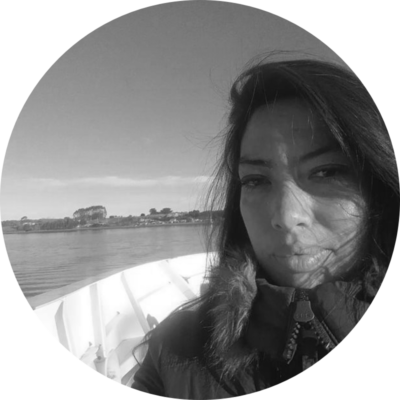
Begoña has worked both with coastal organizations and with individual fishermen, never forgetting her professional calling to the public service sector. While working with various fishing organizations, she supported them in putting together applications for government funding. She also previously worked in fish processing plants and in sea urchin export in New Zealand. She earned her degree in Fisheries Sciences and is currently finishing her Master’s Degree in Environmental Management and Planning at the University of Chile. Additionally, Begoña completed an unforgettable semester studying Biotechnology in Aquaculture abroad at the Autonomous University of Baja California in Mexico.
How did you find your way into marine issues?
When Chileans turn to the East, we see the towering snow-capped Andes Mountains and when we turn to the West, we see the infinite blue of the Pacific Ocean. There is no way to escape the presence of nature in our country. Personally, I turn to the West most of the time. I’m interested in the mysteries of the sea—the chemical, physical, and biological phenomena waiting to be explored. In my childhood, I began collecting seashells. Having now studied aquaculture and environmental sciences as an adult, my admiration for the natural world has only grown. I continue to be surprised by the wonders of the ocean.
What are you most looking forward to doing in the next year?
I want to take things as they come, step by step, completing my master’s work and enjoying myself on the weekends. I aspire that my work positively furthers the region’s future, while respectfully preserving the history and traditions of the fishing communities with which we work. I very much believe that the governance model is a good way to accomplish these objectives. Starting next year, this new concept will be in place as a tool to help us modify and improve our work. I would especially like to see new, legal channels for the direct commercialization of freshly caught fish.
Interest in seafood sustainability and traceability has grown in recent years. Why do you think that is?
I’m fairly certain that if each of us could accompany the products that we consume throughout their complete product lifecycle (so hook to plate in the case of wild-caught seafood) our attitudes towards socially and responsibly sourced products would be different. A major barrier until recently is the limited information that is available to consumers about the journey their products undergo to eventually get to their table. With more access to information, people are beginning to ask more questions about their foods’ origins. At the same time, human-caused environmental damage is becoming more visible, so that has people thinking, how much worse is the damage in the places we can’t see? We have an opportunity to improve people’s attitudes towards sustainability and traceability standards. Through this work, we aren’t just protecting seafood, but also people’s health and dignity; community sovereignty; and ecosystem services and functionality. All of these positive outcomes can be achieved by upgrading our industrial processes and public policies related to sustainable food systems.
What were you doing before you joined our team, and how do you see your previous experience coming into play at Future of Fish?
I grew up in northern Chile. I mention this because there are important differences between Chile’s regions and their particular development needs. My previous work focused on assisting with fisheries community projects and supporting individual fishermen, while I bring subject matter expertise in sea urchin processing, international business, and obtaining funding for community projects. This unique combination of experiences has shaped me into a keenly observant professional, giving me the skills and flexibility to jump in at any point of a project and provide support. Moreover, with such a diverse group of colleagues at FoF, we will undoubtedly learn from each other, further strengthening future collaborations.
What most attracted you to working with Future of Fish?
I aspire to be the person on our team who ties in terrestrial issues within our projects. FoF has a unique vision in how they approach complex environmental issues. The deep respect that FoF brings into their work with communities resonates with me as the right way to bring about environmental and social change.
What do you enjoy doing when you are not working?
I enjoy crafting in all forms and with all varieties of materials —paper, wool, wood, wire, and fabrics. It brings double the amount of meaning to my work when I’m able to work with recycled and repurposed materials. Aside from crafting, I like to read, write song lyrics, play guitar, go out with friends, and spend time at home with my plants and my cats.

Published Dec 10, 2021




